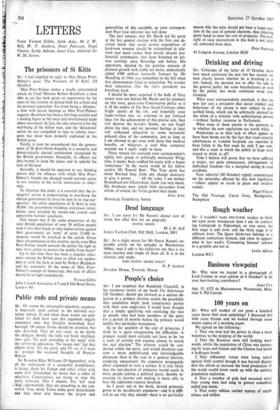Public ends and private means
Sir: Of course the universalist-selectivist argument is important, even central, to the national eco- nomic debate. If and when these words are pub- lished we shall have seen this argument soggily condensed over that Socialist watershed, Scar- borough. Of course Tories should be attentive, but also detached. They do not carry, as no doubt the delegate should, the little red book inscribed, inter alio, 'To each according to his need,' with the yellowing addendum, 'No means test.' Let that defiant ditty. 'It's my party and I'll cry if I want to.' prompt the weekend thoughts of Premier Wilson.
Sir Brandon Rhys Williams (29 September). with all the enthusiasm of a successful pamphleteer, is laying about his Fabian and other critics with some skill. Unsatisfied, he insists that a cabal of selectivist Conservatives are trying to woo the party stalwarts. This I dispute. For 'tail' read -;.'dog'; alternatively, they are preaching to the con- verted. True, many Tories make poor dialecticians and they must also beware the jargon and generalities of this squabble, as your correspon- dent Poor Law reformer has well done.
The fact remains that Mr Heath led his party at the last general election with the firm and de- clared intent that social service expenditure of hard-won revenue should be rationalised to alle- viate real need—rather than merely placate pro- fessorial systematists who have battened on pri- vate earnings since Beveridge and before. His opponents, dazzled by the putative rewards of planned growth with stable tax levels, undauntedly added £900 million (correctly forecast by Mr Maudling in 1964, you remember) to the bill when that phenomenon failed to materialise. No wonder their selectivists (like the ETU'S president) are knocking hard.
I should be most surprised if the bulk of Tory voters were not behind Mr Heath and his planners on this issue, grass-roots Conservative policy as it is. If the author of The New Social Contract, other bright sparks of the CPC, and hopefully your leader-writers too, sir, continue to put forward ideas for the achievement of this precise aim, they will deserve the nation's thanks, we can forget about the isms, and my personal feelings at least will withstand relegation to some notionally debased class of the community, just as long as
I am allowed to get away with those free medical benefits, or whatever, a cool blue computer reminds me I really ought to have.
There remain for exorcism your correspondent's tightly knit group of politically motivated Whigs who, it seems, have saddled his party with a bogus 'conscience.' In the merry words of his fellow analyst Mr Ronald Butt: 'The Tory party has never flinched long from any change necessary to give it power . . All the same, I am neither Roundhead nor Gladstonian, thank you very much. My forebears were simple Irish marauders from whom, of course, the Tories gained their name.










































 Previous page
Previous page